New Refuge Recovery Groups in Seattle Offer
a Buddhist-based Solution to Addiction
Written by: Rebekah Reineke
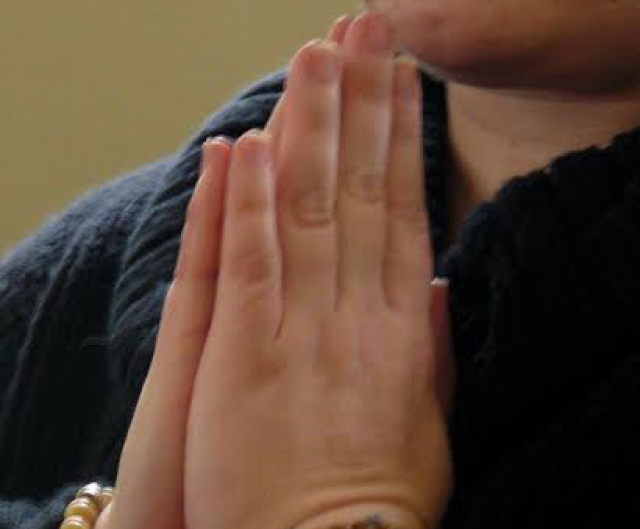
Hands folded together. Photos by: Debra Greenfield
You walk into the Recovery Café in Seattle, and at first you may think you are at an Alcoholics Anonymous meeting.
But wait. Everyone is gathered in a circle, perfectly still, meditating, many of them covered in tattoos. That’s because you’re at a Buddhist Recovery meeting, and specifically a “Refuge Recovery” meeting.
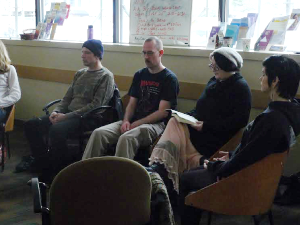
A Refuge Recovery group in meditation.
Refuge Recovery is made up of tools and a path of recovery, based on core Buddhist teachings, which people can follow to free themselves from the suffering that addiction causes in their lives, and in the lives of their loved ones. The concept is recovery by way of the four noble truths, which are about the suffering we create; and by the eight-fold path, the means by which we can be free of suffering.
Refuge Recovery meetings follow the format laid out in counterculture Buddhist teacher Noah Levine’s book, also called “Refuge Recovery.”
In Seattle, Refuge Recovery Northwest is currently made up of two meetings, one held at Recovery Café on Sundays at 1 p.m., and the other on Wednesdays at All Pilgrims Church at 8 p.m.
These are two of the longest-held Refuge Recovery meetings in the United States. Most other meetings have only cropped up in the last few months, whereas ours have been going on for seven to eight months each.
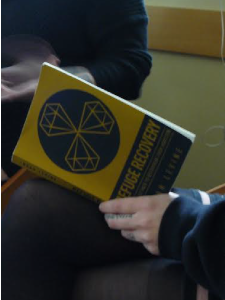
Holding “Refuge Recovery,” the source book for all the meetings.
A new meeting started in Tacoma March 7 at Tacoma Recovery Counseling, and will be every Saturday at 10 a.m.
Levine is a well-known counterculture author and Buddhist meditation instructor, with a strong focus on addiction issues. He is the son of Stephen Levine, also a very well-known Buddhist teacher.
Noah Levine, who has focused on addiction issues during much of his teaching career, believes we can find freedom from the suffering of addiction through the example of the Buddha, the teachings of the dharma, and the community of the sangha.
When Levine saw that few individuals were incorporating Buddhism with the 12-step teachings of Alcoholics Anonymous, he wrote the book “Refuge Recovery,” published in 2014.
In the book Levine emphasized the need for people to support one another on the road to recovery. From this Refuge Recovery meetings started popping up all over the world, especially in the Seattle area.
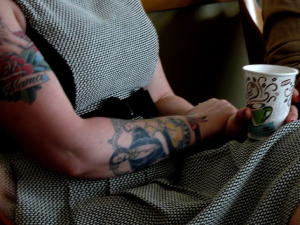
Tattoos and coffee.
As Noah states in his book: “The main inspiration and guiding philosophy for the Refuge Recovery program are the teachings of Siddhartha Gautama (the Buddha), a man who lived in India 2,500 years ago. The Refuge Recovery program has adapted the core teachings of the Buddha as a treatment of addiction. When sincerely practiced, the program will ensure a full recovery from addiction, and a lifelong sense of well-being and happiness.”
Bob R. comes regularly to the meetings, and said this about their importance to him.
“A friend mentioned to me that Noah Levine was going to be speaking in Seattle about his latest book and Buddhist-based recovery program Refuge Recovery. I decided to go and after his talk I had the “Refuge Recovery” book in my hand and I let his assistant know that I was going to help spearhead getting Refuge Recovery meetings going in Seattle,” Bob said. “I’ve had an affinity for Buddhism and meditation since I was in my late teens, my introduction being a book that was given to me titled “A Gradual Awakening,” which coincidentally was written by Noah’s father, Stephen Levine. I love the calm, peaceful energy of the Refuge Recovery meetings, and am grateful for Noah’s vision and effort.”
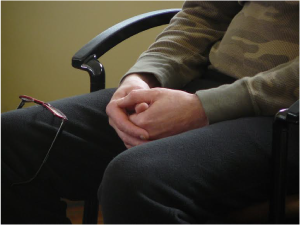
Bob’s hands folded in meditation
We have created a virtual Refuge Recovery Northwest community, which includes a website, and Facebook and Twitter pages.
I am one of the facilitators of the Refuge Recovery groups that now meet at Recovery Café, after years when I had been hoping to incorporate Levine’s teachings into the broader work done at the cafe.
I was at first wary about starting my own group, because there wasn’t a set format for me to follow. But after I met with Levine when on retreat with him in Breitenbush, Oregon, where he often teaches on addiction, he told me about his then-pending “Refuge Recovery” book. It was clear to me that was the format I should be teaching.
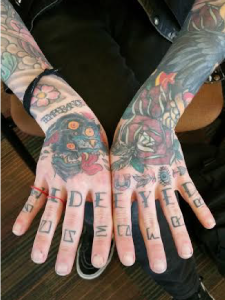
Open hands.
I told him I would be very interested in doing a group in Seattle once the book came out, and he gave me his full support.
The book was published in June, 2014, and immediately I contacted Recovery Cafe about a meeting spot. This organization was important to me, because it had helped me get sober, years before.
Now that meeting draws in 12-14 people a week, and is growing weekly. I also joined the board of directors of Northwest Buddhist Recovery, which supports our meeting, as well as 18 other Buddhist Recovery meetings in the Northwest.
People seeking even more intensive work in this tradition can engage with Refuge Recovery Centers in Los Angeles.
Their mission is to help adults to recover from drug addiction and alcoholism through personal insight, individual therapy, group therapy, education and the principles of Buddhism.
Refuge Recovery is a fresh approach combining modern treatment with principles practiced by Buddhists for thousands of years.
